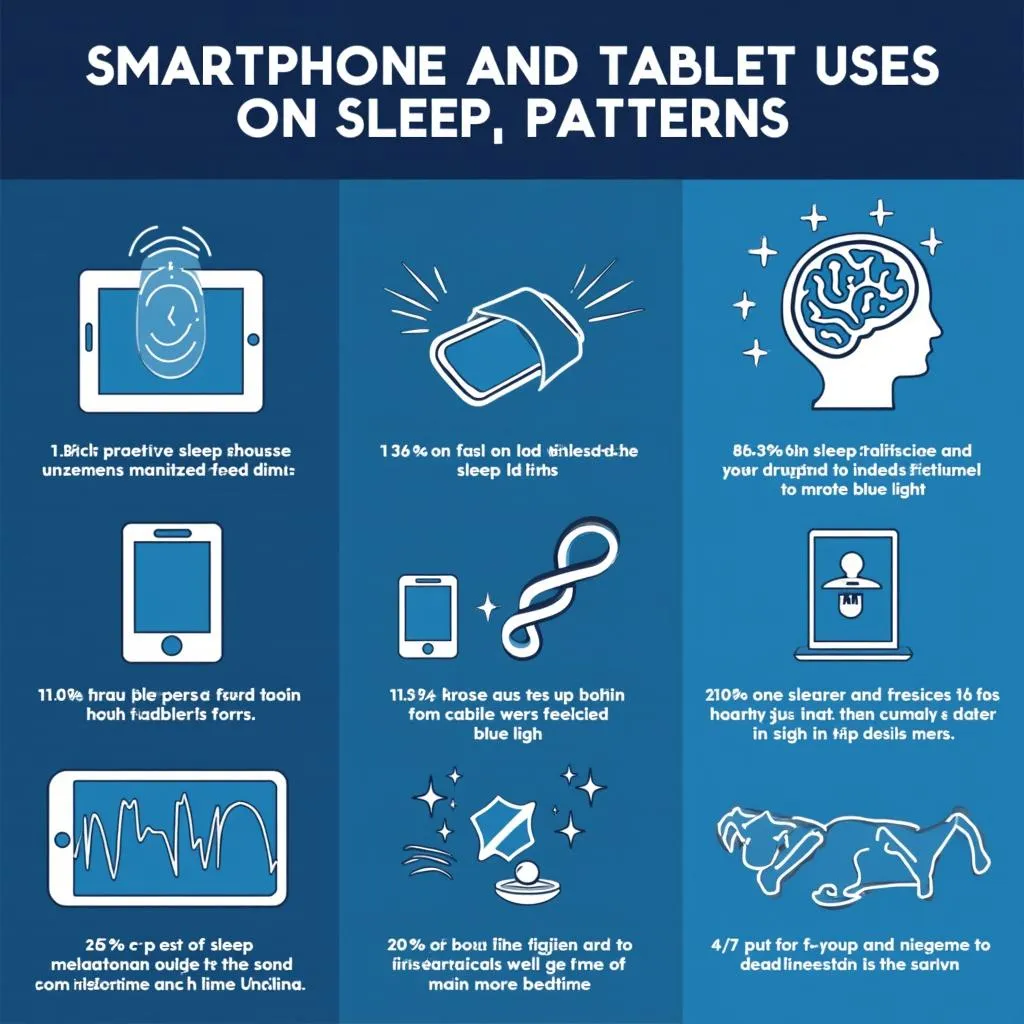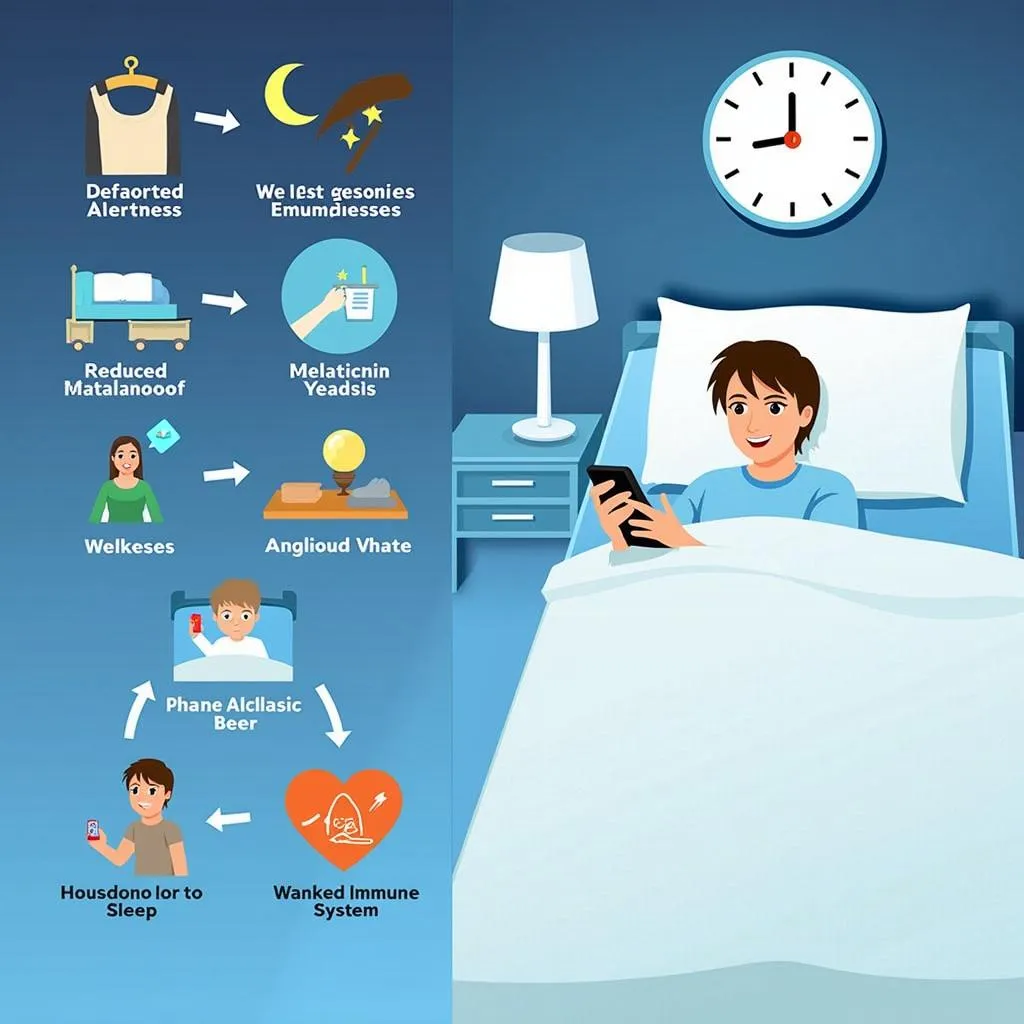The topic of technology’s effects on sleep patterns is a recurring theme in IELTS Writing Task 2. Based on historical data from reputable IELTS websites, this subject has appeared frequently in past exams and is likely to continue as a popular topic. Let’s examine a relevant question that has been featured in recent IELTS tests:
Some people believe that the widespread use of smartphones and other digital devices has negatively affected people’s sleep patterns and overall health. To what extent do you agree or disagree with this statement?
Analyzing the Question
This question requires candidates to discuss their opinion on the impact of digital devices on sleep and health. Key points to consider:
- The main focus is on smartphones and other digital devices
- The question asks about effects on both sleep patterns and overall health
- Candidates should clearly state their level of agreement or disagreement
- Examples and explanations should support the chosen stance
Sample Essay 1 (Band 8-9)
In recent years, the proliferation of smartphones and other digital devices has sparked debate about their impact on our well-being. While these technologies offer numerous benefits, I strongly agree that their widespread use has indeed negatively affected people’s sleep patterns and, consequently, their overall health.
The most significant way in which digital devices disrupt sleep is through their emission of blue light. This type of light suppresses the production of melatonin, the hormone responsible for regulating our sleep-wake cycle. As a result, individuals who use smartphones or tablets before bedtime often find it difficult to fall asleep or experience reduced quality of sleep. This disruption can lead to chronic sleep deprivation, which has been linked to a myriad of health issues, including obesity, cardiovascular disease, and weakened immune function.
Moreover, the constant connectivity provided by these devices can create a sense of urgency and anxiety that interferes with relaxation and sleep. Many people feel compelled to check their emails, social media notifications, or work-related messages late into the night, leading to a state of hyperarousal that is incompatible with restful sleep. This behavior not only reduces sleep duration but also diminishes the restorative quality of sleep, leaving individuals feeling fatigued and less able to cope with daily stressors.
The impact of poor sleep patterns extends beyond just feeling tired. Chronic sleep deficiency can have profound effects on mental health, cognitive function, and physical well-being. Studies have shown that inadequate sleep is associated with increased risk of depression, anxiety, and impaired decision-making abilities. Furthermore, the body’s ability to repair and regenerate itself during sleep is compromised, potentially leading to a weakened immune system and increased susceptibility to various illnesses.
While it is true that digital devices can be used to promote health through fitness apps and sleep tracking technologies, the overall negative impact on sleep patterns outweighs these potential benefits. To mitigate these effects, individuals should establish clear boundaries around device usage, such as implementing a “digital curfew” before bedtime and creating tech-free zones in the bedroom.
In conclusion, the pervasive use of smartphones and other digital devices has undeniably had a detrimental effect on sleep patterns and overall health. As society becomes increasingly reliant on these technologies, it is crucial that we recognize their potential drawbacks and take proactive steps to maintain healthy sleep habits and protect our well-being.
 Technology's impact on sleep patterns and digital devices
Technology's impact on sleep patterns and digital devices
Explanation of Band 8-9 Score
This essay demonstrates excellence in several key areas:
-
Task Achievement: The essay fully addresses all parts of the task, presenting a clear position and developing it thoroughly.
-
Coherence and Cohesion: Ideas are logically organized with clear progression. Paragraphs are well-linked, and cohesive devices are used effectively.
-
Lexical Resource: A wide range of vocabulary is used accurately and appropriately. Sophisticated words and phrases such as “proliferation,” “myriad,” and “hyperarousal” demonstrate a high level of language proficiency.
-
Grammatical Range and Accuracy: The essay showcases a variety of complex sentence structures with a high degree of accuracy. There is a good mix of simple and compound-complex sentences.
-
Development of Ideas: Each main point is well-elaborated with relevant examples and explanations, showing depth of analysis.
Sample Essay 2 (Band 6-7)
In today’s world, smartphones and other digital devices have become an important part of our daily lives. While these technologies have many advantages, I agree that they have also negatively affected people’s sleep patterns and overall health to a large extent.
One of the main reasons why digital devices affect our sleep is because of the blue light they emit. This light can make it harder for our brains to produce melatonin, which is the hormone that helps us sleep. When people use their phones or tablets before going to bed, they often find it difficult to fall asleep quickly or sleep well throughout the night. This can lead to not getting enough sleep, which can cause problems like feeling tired during the day and having trouble concentrating.
Another issue is that people often feel the need to constantly check their devices for messages or social media updates. This habit can be very distracting and can cause stress and anxiety, especially when done late at night. When people are always thinking about their online activities, it can be hard for them to relax and get good quality sleep. Over time, this lack of proper rest can have serious effects on both physical and mental health.
Poor sleep patterns caused by excessive device use can lead to various health problems. For example, not getting enough sleep has been linked to weight gain, because it can affect the hormones that control hunger. It can also weaken the immune system, making people more likely to get sick. Additionally, lack of sleep can negatively impact mental health, possibly leading to problems like depression and anxiety.
However, it’s important to note that digital devices can also be used in ways that promote health. There are many apps and devices designed to track sleep patterns and encourage better sleep habits. Despite this, the overall negative effects of excessive device use on sleep seem to outweigh these potential benefits.
In conclusion, while smartphones and other digital devices have many positive uses, I believe their widespread use has indeed had a significant negative impact on people’s sleep patterns and overall health. It’s important for people to be aware of these effects and try to limit their device use, especially before bedtime, to ensure they get the rest they need for good health.
 Smartphone usage before bedtime and its effects on sleep
Smartphone usage before bedtime and its effects on sleep
Explanation of Band 6-7 Score
This essay demonstrates good writing skills but falls short of the highest band scores:
-
Task Achievement: The essay addresses the task and presents a clear position, but the ideas could be more fully developed.
-
Coherence and Cohesion: The essay is generally well-organized, but some transitions between ideas could be smoother.
-
Lexical Resource: The vocabulary used is appropriate and accurate, but lacks the sophistication seen in higher band scores. There is some repetition of words and phrases.
-
Grammatical Range and Accuracy: The essay uses a mix of simple and complex sentences with generally good accuracy, but there is less variety in sentence structures compared to Band 8-9 essays.
-
Development of Ideas: Main points are supported with relevant ideas, but some points could benefit from more detailed explanation or examples.
Key Vocabulary to Remember
- Proliferation (noun) – /prəˌlɪfəˈreɪʃən/ – rapid increase in the number or amount of something
- Melatonin (noun) – /ˌmeləˈtoʊnɪn/ – a hormone that regulates the sleep-wake cycle
- Chronic (adjective) – /ˈkrɒnɪk/ – persisting for a long time or constantly recurring
- Hyperarousal (noun) – /ˌhaɪpərəˈraʊzəl/ – a state of increased psychological and physiological tension
- Cognitive function (noun phrase) – /ˈkɒɡnətɪv ˈfʌŋkʃən/ – mental abilities and processes related to knowledge, attention, memory, judgment, and reasoning
- Susceptibility (noun) – /səˌseptəˈbɪləti/ – the state of being likely or liable to be influenced or harmed by a particular thing
- Mitigate (verb) – /ˈmɪtɪɡeɪt/ – make less severe, serious, or painful
- Pervasive (adjective) – /pərˈveɪsɪv/ – spreading widely throughout an area or a group of people
- Proactive (adjective) – /proʊˈæktɪv/ – creating or controlling a situation rather than just responding to it after it has happened
- Detrimental (adjective) – /ˌdetrɪˈmentl/ – tending to cause harm
Conclusion
The impact of technology on sleep patterns is a significant and relevant topic in IELTS Writing Task 2. As we’ve seen from the sample essays, this subject allows for a rich discussion of both the negative effects of digital device usage and potential solutions. When approaching similar topics, remember to:
- Clearly state your position
- Provide specific examples and explanations to support your arguments
- Consider both sides of the issue, even if you primarily agree with one perspective
- Use a range of vocabulary and sentence structures to demonstrate your language proficiency
For further practice, consider writing essays on related topics such as:
- The impact of social media on mental health
- The role of technology in improving work-life balance
- The effects of screen time on children’s development
Remember, the key to improving your IELTS Writing score is consistent practice and reflection on your work. Try writing your own essay on this topic and share it in the comments section for feedback and discussion. This active approach to learning can significantly enhance your writing skills and prepare you for success in the IELTS exam.
The effects of digital technology on mental health is another important topic that often appears in IELTS Writing Task 2. Understanding the broader implications of technology use can help you develop more comprehensive arguments in your essays.
Additionally, exploring how technology affects sleep patterns in more detail can provide you with valuable insights and vocabulary for tackling similar questions in your IELTS preparation.
As you continue to practice, remember that balancing technology use is crucial not only for exam success but also for personal well-being. Many parents grapple with the question of whether they should limit children’s screen time, which is another related topic you might encounter in IELTS Writing Task 2.
By thoroughly exploring these interconnected themes, you’ll be well-prepared to address a wide range of technology-related questions in your IELTS exam and beyond.


